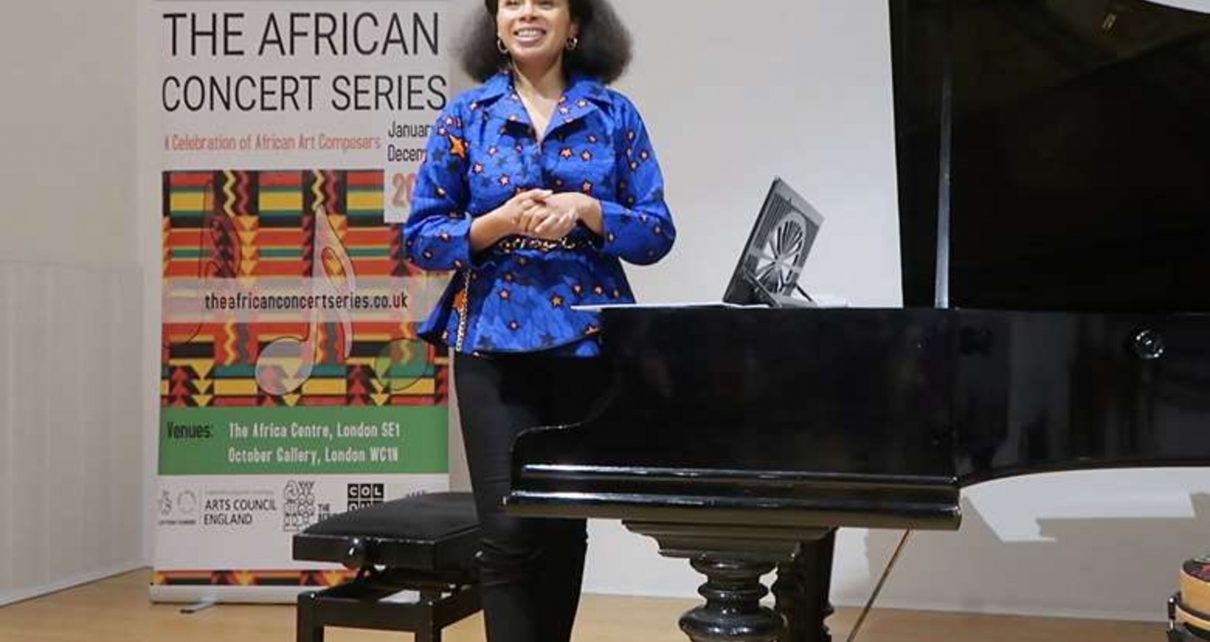Her African Concert Series is a monthly programme of African classical music that she started directing in 2019 at the October Gallery in London at the behest of the cultural organisation, the Institute of Art and Music, AMI5. In the course of her career, Romanian-Nigerian pianist, Rebeca Omordia, has gone into partnerships with various musicians, including cellist Jiaxin Lloyd Webber, and has just done a recording of British double bass music with Leon Bosch. From time to time, she visits Nigeria and wows the Lagos audience at the MUSON Centre. Being Romanian-Nigerian, she maintains strong links with Romania, where she performs in her home town of Craiova. In December 2021, Nkanu Egbe had a very fulfilling conversation with her. Here are excerpts of the interview with Rebeca Omordia:
How have you been? It’s been over two years since we last spoke.
Since then, the world has changed. The work I do has remained the same. I am pioneering African music. This is still going ahead.
Let’s talk about these your interventions in African music. The African Concert music. It started in 2019. Did you anticipate the COVID-19 lockdown?
No. the series was a continuation of the work I started in Ekele (a compilation of African tunes on the piano by Rebecca Omordia). The series was directed at a wider audience.
Ekele came out to global critical acclaim. How does that make you feel?
I have just finished recording a second one with a different label. While Ekele focused on mainly Nigerian composers, the next CD is focusing on the music from Africa but there’s also music from Morocco and South Africa and it’s going to be very exciting.
Now Ekele had music by Christian Onyeji, Ayo Bankole, and Fred Onovwerosuoke, you did a very good job and I noticed that the African compositions are very rhythmic and that means that your audience who have been used to smooth, flowing music will be very jolted by the hard clubbing of the piano.
Yes, well this is what you have with West African composers, especially Professor Akin Euba and Professor Nketiah from Ghana, who developed African pianism, which is a concept that uses the piano as a medium to express traditional music from West Africa. So, they use the piano for percussive sound effects through rhythm, and we know West Africans like to have parties and dance, and this is reflected in the music from Nigeria. Of course, as you will see in my upcoming CD, there’s a big cultural and musical difference between the music of West Africa and the music of North Africa because they are completely different traditions and cultures and I think this is a great opportunity to emphasise to the world that Africa is just not one Big Country?
Have you been able to go on any tour based on Ekele?
Yes, well I played it a lot in the UK on the British radio channels like BBC Radio 3, Radio 4 and Classic FM and I also took it to the States in 2019, which was a year before the lockdown, and I played it in New York and Washington.
What was the feedback like?
People loved it. That’s why Ekele was the main basis on which we launched the African Concert Series because people wanted to hear more African music, and this directed the interest of the UK audience to the music from Africa. So, it was a great reception.
When you created the African concert series, how did you envision it should be?
Well, it was an idea I had before releasing Ekele. I first mainly focused on finding piano scores but most of the music had never been published. I got in touch with all the Nigerian composers I could find on social media, and everybody sent me score sheets. So, I have hundreds of score sheets. And of course, among the piano scores, there was also chamber music, and I had to play through everything to see how they sounded and what was the best. Then, I realised the most natural way of expression by humans is through voice and singing and there were so many beautiful songs which reflect the culture of the ethnic group because the composer of each group is using language to compose the songs and I think that’s the clearest way for people to understand – the culture of the ethnic group. And so, my dream, before the idea of the CD, was initially recording piano music CDs, then Chamber music CDs, and song CDs. And so there would be a series of recordings because I didn’t think it would be possible to even launch a Concert Series. But then I was contacted by a producer at the time. He wanted me to perform Ekele in one concert. Then, he said, “I would like you to perform it in four concerts.” He was willing to pay me for four concerts. So, I did the first concert and the reaction from the audience was so impressive that he said we should continue. And of course, we were very fortunate because he sponsored the first six concerts, and we had it planned for the whole year and I had an artist who made up the programmes and scheduling, and I even had artist friends that were willing to participate because there wasn’t that much finance. But halfway through the series, we met some problems, which I cannot really go into now. At the time, we still had five concerts left. Some people had already bought their plane tickets. At this time in the project, I had done so much for the series and so much pioneering, that in the end, I just decided to bail it out myself. I took a loan and paid for the rest of the series
Have you gotten any feedback from anybody in Nigeria in the authorities?
Well, in 2019 I performed in Abuja on the occasion of International Women’s Day. It was a concert organised by the Romanian embassy and in the audience, there was a woman named, Fatima, who was the daughter of President Buhari, and there was also Mrs Osinbajo. I did play some music from Ekele, which they enjoyed very much. But we didn’t get to have a conversation because the security around them was very much. So then, of course, one didn’t have access and at the time, the series was just in its very beginning. We had done only just a few concerts; so, we hadn’t made the impact that we would later have.
In the 2022 series, what venues would you be using?
We are using various venues but we are mainly based at the October Gallery Africa centre, which is our partner, and they have allowed us to use their venue for a number of concerts, but we are making the series to be the highlight of the year, even though there are quite a few highlights but the main one which I think is a historic event will be an African concert series in the week of 5th of February. So, there will be three concerts for an audience that has never come in contact with African music, and possibly the whole eyes of the world will be on us because everyone who is an established artist dreams to play at that venue.
Is it possible that the patrons of classical music will take up the African concert series itself?
We hope they do. We have opened a PayPal account, which whoever wants to donate is very welcome to. Of course, we see more and more organisations investing in our work, but we are looking for more support because there’s so much to do. There’s so much music to bring out and there are so many artists willing to perform.
Are you a registered Trust?
No not yet.
Has there been any interaction with the Nigerian High Commission? I know you go there to renew your Nigerian passport.
Yes, I had a partnership with them almost 10 years ago in 2013, but there was a different high commissioner back then and he was very supportive. Actually, at the time Ekele was born, I was only researching, and they helped me to bring it to the Nigerian audience. They invited me to perform the music at their diplomatic functions and they were the first in the UK to help me with that.
Do you have enough Nigerians in the audience?
Yes. Our audience has been mainly Nigerian because we had a lot of music by Nigerian art composers and there is a school of art music in Nigeria and that is where it’s all funded in Nigeria. That’s where most of the composers come from. Then, of course, they used very popular tunes which they did transcribe. So, our audience can relate to songs like ‘sweet mother’.
When are you bringing the African concert series to Nigeria?
When the Nigerian Government flies us in but I would like the Nigerian Government to fly more artists to the UK so they can bring their culture to the British audience.



